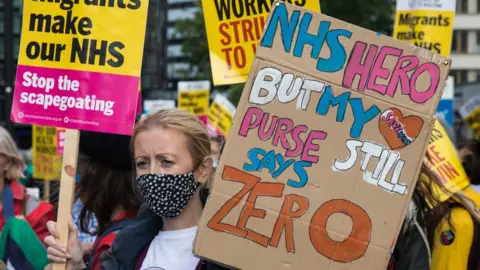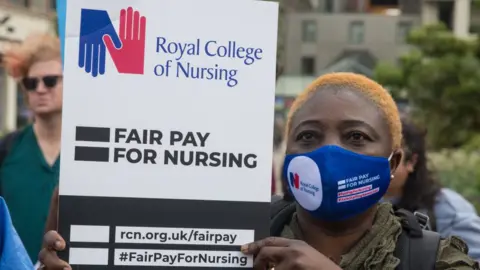Nurses' strike: 'I want to join the picket but can't afford to'
 Getty Images
Getty ImagesWith nurses set to go on strike on two days in December, not all who support the action are able to take part.
"It's not a political choice, it's a financial one," says Lizzie*.
She wishes she could join her colleagues on the picket lines but says union membership fees mean she can't afford it.
And even if she could, Lizzie says, losing two days' pay during the biggest walkout in NHS history would cause her real problems.
"My team know that I would have voted yes and I'm supportive of my colleagues," says Lizzie.
"I'm not in a union because I can't afford it."
Nevertheless, many nurses around England, Wales and Northern Ireland will go on strike.
Whether they walk out or not will depend on who they work for.
So, in some cases, even if you wanted to strike you wouldn't be able to if most of the colleagues in your trust voted not to.
 Getty Images
Getty ImagesIt costs £16.40 a month to join nurses' union the Royal College of Nursing (RCN), although it's cheaper for students and newly registered nurses.
The union says the fees entitle members to benefits including confidential advice and support as well as workplace representation.
Striking workers aren't paid for days on the picket line and Lizzie, from Hampshire, says union membership fees are also out of her reach.
All workers can take part in legal, official strike action, even if they're not in a union, and still have the same rights as their unionised colleagues.
Lizzie, 34, is a single mum of two and says she takes home about £1,800 a month and relies on Universal Credit to top up her wages.
She spends more than half her income on rent and says she can't justify union fees once she's paid for things like childcare and her car.
"Once everything's paid, I haven't got enough to live off," Lizzie says. "So at the end of the day, being in a union is the least of my priorities."
The RCN announced strikes on 15 and 20 December in its pay dispute with the government. Emergency care will continue but routine services will be hit.
It wants a 19% pay rise for nurses, however the government has said that is "unaffordable" and it has met independent recommendations on nurses' pay.
 Jade Adam
Jade Adam"I know it's going to be really difficult to be working both of those days knowing that I should be out there with everyone else taking a stand," says 24-year-old nurse Jade Adam.
She works for the East London Foundation Trust, where the threshold for strike action was not met and so she won't be able to walk out.
"I was absolutely gutted," she says.
"I'm working on both of the strike days so I can't go and support my colleagues who are on the picket lines."
Jade is a mental health nurse and now works in police custody. Even though she's still early in her career, she voted for strike action over her concerns about understaffing and pay.
"Nursing is not an attractive profession anymore," she says.
"I voted to strike because it needs to change or the NHS is just going to crumble and I can't just kind of stand back and watch that happen."
Although she can't join the picket line, Jade is doing her best to support her striking colleagues in any way she can.
"If you can strike, do it, take a stand for the rest of us that can't," she says.
Alex*, is unable to strike next month at the hospital in London where she works due to her shift pattern.
She resents the missed opportunity to withdraw her labour because she will be on a day off anyway.
"It feels like less of a message has been sent," the 22-year-old says. "I think it would be more effective if I was on shift."
She's an RCN member and as a newly qualified nurse she pays a bit less for her membership.
She voted yes to strike action, despite only being a few months into the job, and still plans to support her colleagues who will be walking out.
Like Jade, Alex trained during the pandemic and describes challenging situations and having to pick up extra work while colleagues were off ill or isolating.
"I didn't want to have to stay in the in the profession if things were not going to change, or if there wasn't the start of change at least," she says.
 Getty Images
Getty ImagesAlthough there has been criticism of the decision to strike, Lizzie says she's grateful to her colleagues who are "taking that hit because I can't afford to".
Going into work on those days will mean crossing the picket for Lizzie. However, the RCN says staff won't face any criticism for going to work.
"I'll walk past them and wish I could be striking with them I think," she says.
*Names have been changed in this article to protect identities.
Clarification 21 December: This article was updated to include that non-union members are able to take part in legal, official industrial action.


If you're a nurse taking part in the strikes, or a patient who has been affected by them, we'd like to hear from you. Share your experiences by emailing [email protected].
Please include a contact number if you are willing to speak to a BBC journalist. You can also get in touch in the following ways:
- WhatsApp: +44 7756 165803
- Tweet: @BBC_HaveYourSay
- Upload pictures or video
- Please read our terms & conditions and privacy policy
If you are reading this page and can't see the form you will need to visit the mobile version of the BBC website to submit your question or comment or you can email us at [email protected]. Please include your name, age and location with any submission.

